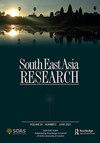Adapting to local markets and political changes: Chinese businesses in Malaysia and Indonesia
IF 0.9
3区 社会学
0 ASIAN STUDIES
引用次数: 1
Abstract
ABSTRACT The economic prosperity of Asian tigers is largely dependent upon the role of ethnic Chinese in forming an economic elite across the countries. The emerging countries of Asia are a diverse group, but Malaysia and Indonesia have a shared history that results in a familial bond between these two countries, with embedded similarities in language, culture and religion. Both countries have experienced an important structural shift in Chinese Malaysian and Chinese Indonesian businesses. Studies have also shown that these ethnic businesses function successfully in their home countries, resulting in inter-ethnic business partnerships between Chinese and Bumiputera or Pribumi, to the extent that collaboration is seen as one of the strategies for business survival. This has led to changing perceptions of ethnic ties. However, scholars have often neglected the relationship between ethnic businesses and political changes with regard to small and medium enterprises (SMEs) in Malaysia and Indonesia across generations. To shed some light on the issues and challenges of ethnic Chinese businesses in Malaysia and Indonesia, especially SMEs, we investigate cultural assimilation and adaption process to demonstrate how an ethnic enterprise functions following the emergence of political changes across generations in terms of its targeted market and the types of goods and services it provides.适应当地市场和政治变化:在马来西亚和印度尼西亚的中国企业
亚洲虎的经济繁荣在很大程度上取决于华人在各国经济精英中的作用。亚洲新兴国家是一个多元化的群体,但马来西亚和印度尼西亚有着共同的历史,这导致了这两个国家之间的家族纽带,在语言、文化和宗教方面有着内在的相似之处。两国都经历了马来西亚华人和印尼华人企业的重要结构转变。研究还表明,这些少数民族企业在其祖国成功运作,导致中国人与土著人或普里布米人之间建立了跨民族商业伙伴关系,合作被视为企业生存的战略之一。这导致人们对种族关系的看法发生了变化。然而,学者们往往忽视了马来西亚和印度尼西亚几代中小企业的民族企业与政治变革之间的关系。为了了解马来西亚和印度尼西亚华人企业,特别是中小企业的问题和挑战,我们调查了文化同化和适应过程,以展示一家华人企业在几代人的政治变革后,在其目标市场及其提供的商品和服务类型方面是如何运作的。
本文章由计算机程序翻译,如有差异,请以英文原文为准。
求助全文
约1分钟内获得全文
求助全文
来源期刊

South East Asia Research
ASIAN STUDIES-
CiteScore
1.90
自引率
0.00%
发文量
42
期刊介绍:
Published three times per year by IP Publishing on behalf of SOAS (increasing to quarterly in 2010), South East Asia Research includes papers on all aspects of South East Asia within the disciplines of archaeology, art history, economics, geography, history, language and literature, law, music, political science, social anthropology and religious studies. Papers are based on original research or field work.
 求助内容:
求助内容: 应助结果提醒方式:
应助结果提醒方式:


